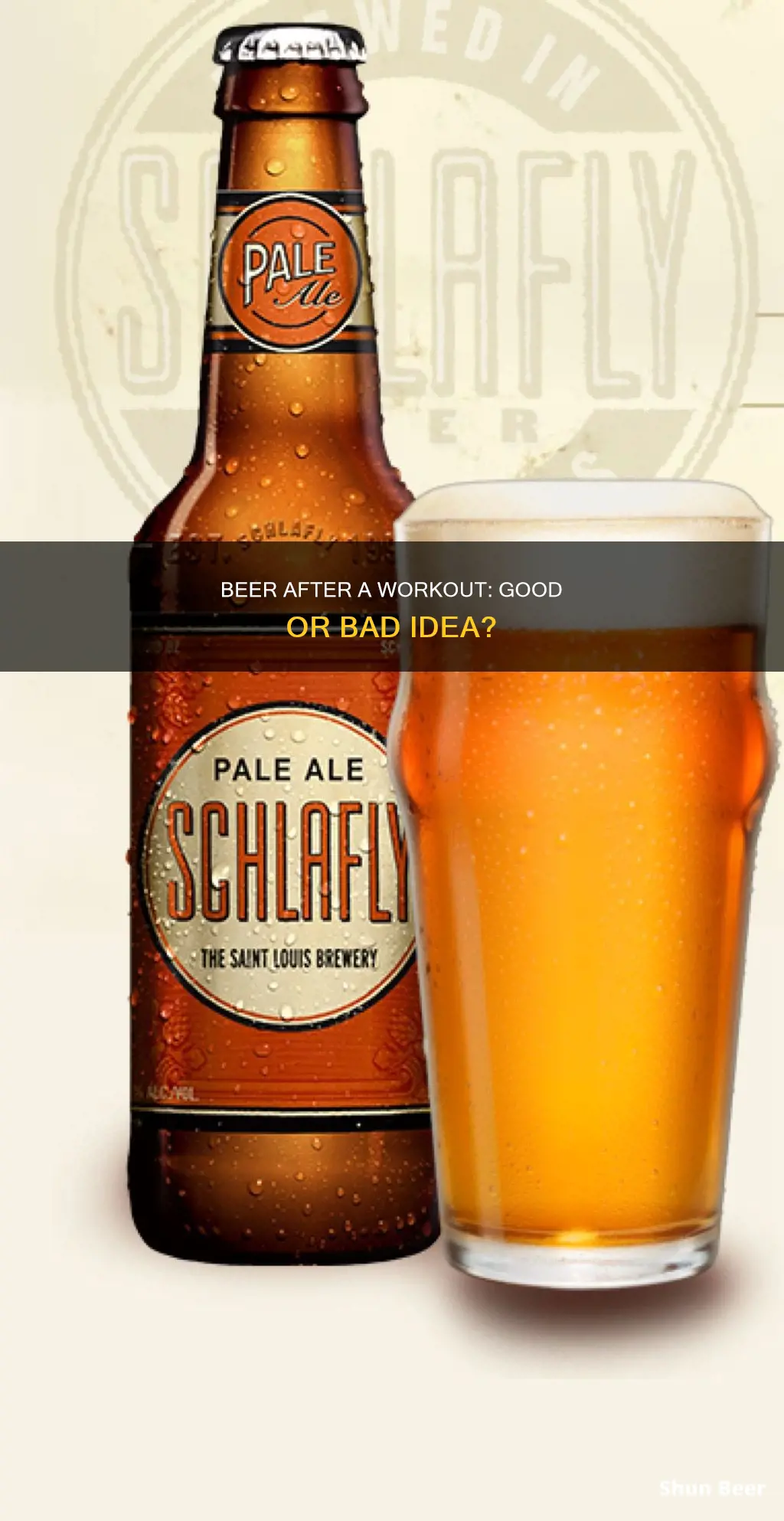
Drinking beer after a workout is a common way to celebrate and socialise with friends. However, it is important to be aware of the effects of alcohol on the body, especially when combined with exercise. Alcohol is a diuretic, which means it increases urine production and can lead to dehydration. This can be particularly detrimental after exercise, as the body is already dehydrated from physical activity. Alcohol also impairs muscle recovery by interfering with protein synthesis and can cause nutritional imbalances, weight gain, and negative interactions with medication. On the other hand, moderate alcohol consumption may not have long-term negative effects on performance, and a low-ABV beer can be an effective post-workout hydrator.
| Characteristics | Values |
|---|---|
| Dehydration | Alcohol is a diuretic, which causes dehydration. |
| Recovery | Alcohol negatively impacts post-workout recovery, including muscle recovery and growth. |
| Sleep | Alcohol can disrupt sleep, which is an important part of the workout recovery process. |
| Nutrition | Alcohol can cause nutritional imbalances and ruin your meal plan. |
| Weight | Alcohol can cause weight gain due to its high calorie content. |
| Safety | Alcohol can increase the risk of injuries and negatively impact performance. |
| Social | Drinking beer after a workout can be a social experience. |
What You'll Learn

Dehydration
Drinking alcohol after a workout can lead to dehydration as it is a diuretic, causing you to urinate more fluids than usual. The more you drink, and the more regularly you do it, the more your recovery and overall fitness level may be affected. In some cases, you may need to drink twice as much water after just one alcoholic drink to get fully rehydrated.
To minimise the dehydrating effects of beer after a workout, choose something with a lower alcohol content, and be sure to drink plenty of water. It is also important to drink water before and during your workout to ensure you are optimally hydrated.
The amount of water you need depends on the intensity and duration of your workout, as well as the environmental conditions. As a general guideline, it is recommended to drink one cup of water at least four hours before exercising, 4 to 5 ounces of water every 10 to 15 minutes during exercise, and enough water to double the amount lost during exercise afterward.
Urine colour is an easy way to tell if you are dehydrated; it should be a light colour, similar to lemonade. If you are scientifically-minded, you can also measure fluid loss by weighing yourself before and after exercise and calculating the difference. For every pound of water weight lost, drink 24 ounces of water to rehydrate.
The Knockout Beer Bong: How Does It Work?
You may want to see also

Impaired muscle recovery
Drinking beer after a workout can impair muscle recovery. This is because alcohol interferes with protein synthesis, which is necessary for muscle repair and growth. When you exercise, small tears appear in your muscles, and your body uses protein to rebuild these torn muscles. However, drinking alcohol makes it harder for your body to use proteins, leaving your muscles sore and damaged.
Alcohol also reduces the secretion of human growth hormone (HGH), which is also necessary for muscle repair and growth. Alcohol can disrupt sleep, and it is during sleep that the body produces HGH. One source states that alcohol can reduce the secretion of HGH by as much as 70%.
Additionally, alcohol consumption can lead to nutritional imbalances, higher cortisol levels, and lower testosterone levels. Cortisol is a stress hormone that can inhibit protein synthesis, and testosterone is a male sex hormone that is necessary for building muscle bulk and strength.
Drinking beer after a workout can also lead to weight gain. Alcohol is a source of 'empty calories', providing lots of energy but little nutritional value. This means the calories consumed from alcohol are more likely to be turned into fat.
However, it is important to note that drinking one or two beers after a workout will not significantly harm your recovery. The negative effects of drinking alcohol after working out increase the more you drink.
The Magic Behind Beer Filtration: Using Sheet Filters
You may want to see also

Nutritional imbalances
Although alcohol contains carbs, it is metabolised and stored as fat, so it does not help with refuelling or rebuilding muscle. Alcohol also impairs the body's ability to synthesise proteins, which are needed to repair the tiny tears in muscles that occur during exercise.
In addition, alcohol consumption after physical activity can lead to higher cortisol and lower testosterone levels. Cortisol is a stress hormone, and excess cortisol can inhibit the protein synthesis the body needs to build muscle. Testosterone is a male sex hormone, and without adequate levels of it, it is difficult to build muscle bulk and strength.
Understanding Beer Distribution: From Brewery to Glass
You may want to see also

Sleep disruption
Drinking beer after a workout can have a negative impact on your sleep, which is an important part of the workout recovery process. Alcohol negatively affects your sleep quality, causing more disruptions and reducing the amount of time spent sleeping.
Alcohol affects your sleep by altering your sleep architecture. Typically, a sleep cycle consists of three non-rapid eye movement (NREM) stages, followed by a rapid eye movement (REM) stage. During the first part of the night, NREM sleep dominates, while REM sleep increases during the second part. Each stage plays a vital role in ensuring your sleep is refreshing and facilitates essential processes like learning and memory consolidation.
When you drink alcohol before bed, you're likely to experience more N3 sleep or "deep sleep" and less REM sleep initially. However, later in the night, once your body has metabolized the alcohol, you'll have more N1 sleep, the lightest stage of sleep, leading to frequent wakings and fragmented sleep. This disruption can leave you feeling tired the next day.
Additionally, alcohol can interfere with your body's circadian rhythms, which are biological patterns that operate on a 24-hour clock. Alcohol may decrease your body's sensitivity to cues like daylight and darkness, which are crucial for regulating your sleep-wake cycle. As a result, you may feel alert when you want to sleep and sleepy when you want to be awake.
The negative impact of alcohol on sleep is even more pronounced in individuals with alcohol dependence. Studies show that insomnia is a common issue for those struggling with alcoholism, and it can contribute to a destructive pattern where individuals drink alcohol to fall asleep but then experience poor sleep and increased daytime sleepiness.
To avoid sleep disruption, experts recommend avoiding alcohol at least three hours before bed. It's important to prioritize sleep and proper recovery after working out to ensure your body can repair and strengthen muscles effectively.
Beer Foam Stones: Do They Work?
You may want to see also

Weight gain
Drinking beer after a workout can lead to weight gain. Alcohol is a source of ""empty calories", which means it provides a lot of energy but little nutritional value. The calories from alcohol are therefore more likely to be turned into fat. Even a light beer can contain around 100 calories, so if you're exercising to lose weight, drinking beer after a workout won't do you any favours.
A study found that men and women who drank weekly were more likely to be physically fit than those who didn't drink. Researchers theorise that this may be because physically fit people are more likely to drink to celebrate their athletic wins or soften their losses. There is also the emergence of "drunkorexia", where some people, particularly women, exercise more to offset the extra calories from drinking.
If you're drinking beer after a workout, it's important to be mindful of how it may impact your body's ability to rehydrate and recover. Regular alcohol consumption could set you back if it causes hangover-induced sluggishness or weight gain. However, if you're exercising for fun or to keep up your fitness levels, moderate alcohol consumption is not a cause for concern.
Beer Collectables: A Guide to Their Functionality and Value
You may want to see also
Frequently asked questions
Drinking beer after a workout is not recommended as it can negatively impact your recovery. However, having one beer after a workout once in a while won't have long-term effects.
Drinking beer after a workout can lead to dehydration, impaired muscle recovery, nutritional imbalances, weight gain, and disrupted sleep. It can also increase the risk of injuries and negatively impact your overall fitness level.
Some studies suggest that drinking a low-ABV beer (less than 4%) can be effective for rehydration and may even be better than water in some aspects. Beer also contains carbohydrates, electrolytes, and polyphenols, which can have potential health benefits.
It is recommended to wait for at least an hour after finishing your workout before having your first beer. This allows time to replenish electrolytes, rehydrate, and fuel your body with a nutritious meal or snack.
Yes, there are several alternatives to drinking beer after a workout. You can try non-alcoholic beer, mocktails, or recovery drinks that provide protein, carbohydrates, and electrolytes to support your body's recovery process.







